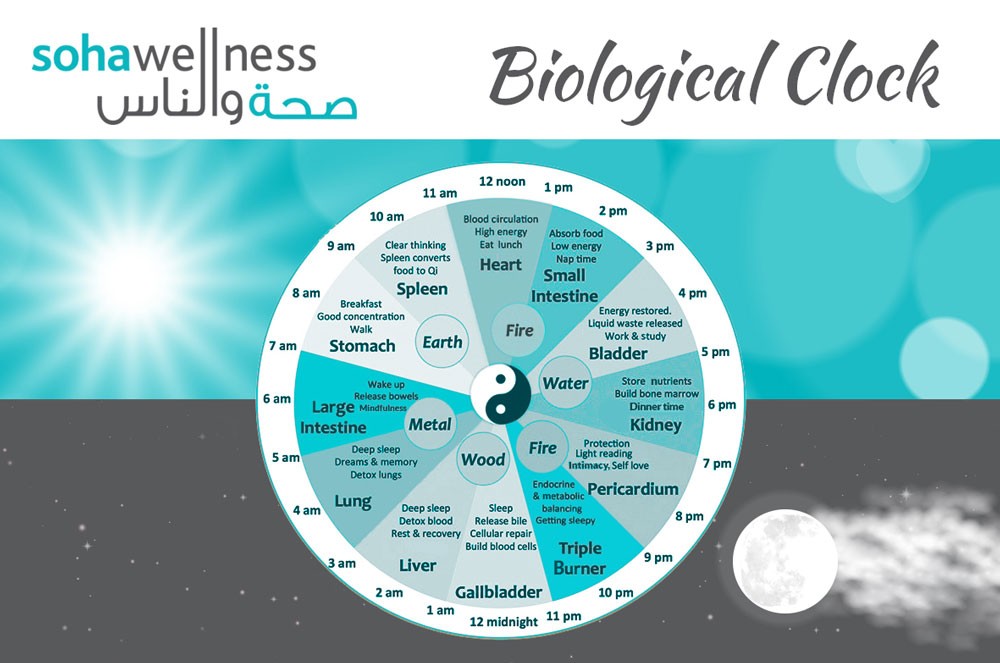The Chinese Biological Clock, also called Chinese Meridian Clock or TCM Body Clock, can help us understand and address health problems and changes in our energy levels or mood throughout the day.
Ancient traditional Chinese medicine (TCM) theory, divides the body based on 12 organ meridians – energy channels that transport life energy (chi/qi) throughout the body in two-hour intervals.
One of the most important concepts of TCM is balance, or yin and yang. To attain optimal health, we must always see balance and ensure the free flow of qi throughout our bodies.
The 12 meridians are divided into six yin and six yang meridians. Jin meridians correspond to the organs which collect, store and handle matter and energy: heart and surrounding area, kidneys, liver, lungs, and spleen. Yang meridians include organs which handle energy and excrete matter: bladder, duodenum, colon, gallbladder, intestines, and stomach.
Each meridian is influenced by one of five elements: earth, fire, metal, water, and wood. In TCM, each of these elements is associated with certain organs and characteristics, something I will cover in-depth in a future article, as I will do for the emotions that TCM links to each organ.
Poor lifestyle habits, injury, and stress can block our qi and result in imbalances. Symptoms of an unbalanced meridian will most likely be experienced during the hours when that particular meridian is most active. For example, a stomach problem may worsen between 7 – 9 am, as the meridian for the stomach is most active during those hours.
Our bodies can function more efficiently and defend against illness when we plan our daily activities around each organ system’s peak energy and avoid actions that can burden an organ system when its energy is at its lowest level.
It is important to note that the organs defined by TCM differ from those defined by Western Medicine. For example, the triple burner and pericardium are not anatomical structures, but functional units within TCM.
A brief explanation of the 24-hour cycle:
3 am – 5 am: Lungs
While you’re hopefully deeply asleep, the lungs loosen mucus and waste, this can be why you cough when you wake up. If this happens often, it indicates that you should adjust your diet and lifestyle.
5 am – 7 am: Large Intestine
Time to wake up, drink water, and have your first bowel movement. This is the worst time to have caffeine which is a diuretic while your body needs a lot of water for a healthy colon and intestine. If you don’t feel well during this time period, drink plenty of water.
7 am – 9 am: Stomach
The stomach is at its peak and is best able to absorb the nutrients from food. Time to have a healthy breakfast and go for a brisk walk. If you experience stomach problems or have no appetite at this time you need to review your eating patterns.
9 am – 11 am: Spleen
In TCM, the word spleen describes not the organ, but the digestive process itself, including blood sugar management and the release of digestive enzymes from the pancreas. A late breakfast will still be well-digested. This is a great time to get active and start work as a healthy spleen helps you focus.
11 am – 1 pm: Heart
Studies have shown that there is an increased occurrence heart attacks during this timeframe, so don’t overtax your heart at this time, and consider spending these two hours having lunch and connecting with others.
1 pm – 3 pm: Small Intestine
From 1 – 3 pm your energy levels may be low, and this is a great time to take a nap. At this time, you are more likely to experience indigestion, abdominal pain, and bloating – all signs that you need to review your diet.
3 pm – 5 pm: Bladder
Your energy levels should be restored now, and this is a great time to work, study, and drink plenty of water.
5 pm – 7 pm: Kidneys
This is the best time to have dinner and to restore your energy. Your kidneys store your energy reserves. If they are healthy you will feel energetic at this time. Feeling tired at either this time or from 5-7 pm, when your kidney energy is at its weakest, indicates that you may need to manage your stress levels.
7 pm – 9 pm: Pericardium
The pericardium is responsible for the brain, circulation, and productive organs. This timeframe is great for socializing and self-care so relax and maybe do a bit of reading. Avoid large evening meals, opt for a light meal instead.
9 pm – 11 pm: Triple Burner
In TCM, the triple warmer coordinates and regulates energy, water, and temperature and manages blood vessels and arteries which go into repair mode during this time. You will start feeling sleepy and should continue to focus on relaxation.
11 pm – 1 am: Gallbladder
Time to go to sleep and regenerate. If you suffer from gallbladder stones, these are the hours you are most likely to experience pain.
1 am – 3 am: Liver
By now you should definitely be sleeping deeply and dreaming. The liver is in the midst of the detoxing process. If you wake up during these hours, it can mean that your liver is overwhelmed by poor diet, alcohol, or medications, and that you may need to consider a healthier lifestyle.
You can use the Chinese Biological Clock image below to learn how to balance your body.
In our fast-paced and quite often stressful society, we can learn from the wisdom that is deeply ingrained in Traditional Chinese Medicine and implement that wisdom to optimize our health.

